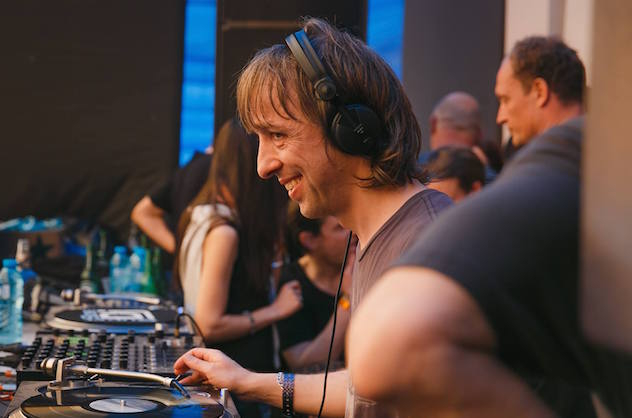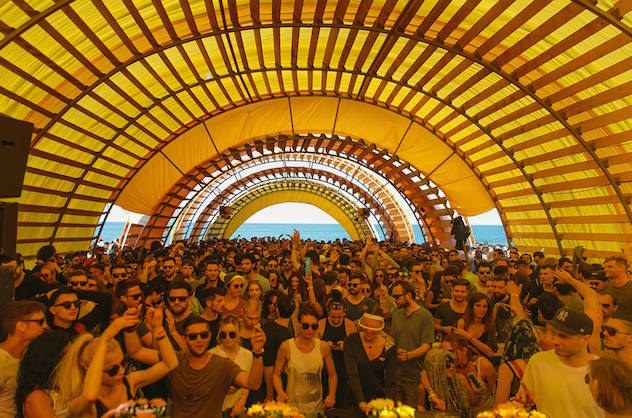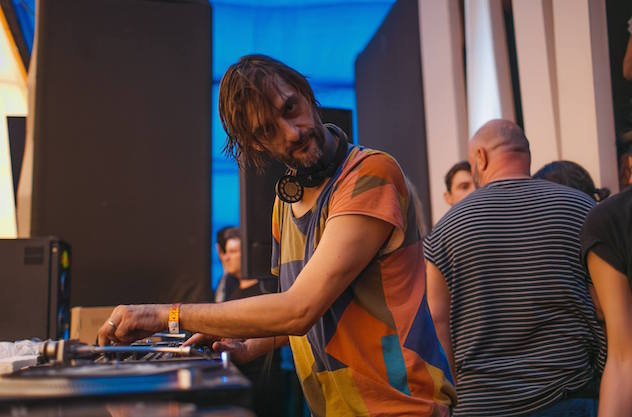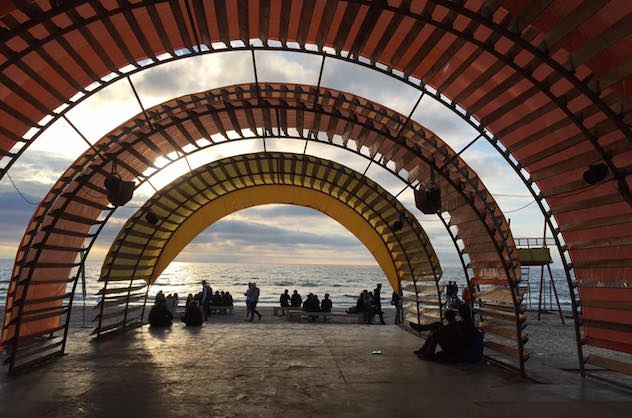- Sunwaves is one of Europe's best-loved festivals, and for good reason. Across 19 editions, the Romanian event has stuck to a well-defined music policy and ethos based around three simple things: loopy house and techno, long DJ sets and crystal-clear sound. This combination has generated a loyal following, and for fans of minimalist dance music there's no better festival. The style's key players—Ricardo Villalobos, Zip, Rhadoo, Sonja Moonear—are given prime-time slots in front of crowds who know exactly what they're going to get—an important factor, considering the often polarising affect this kind of repetitive music can have at festivals. But as Sunwaves has expanded over the years, certain aspects central to its success have grown too extreme: some DJs play sets so long they border on the absurd, and a niche strand of minimal that once made the festival so exciting now feels flat.
Sunwaves 19 was my first time at the festival, and it will probably be my last. Everything was set for a great weekend: I'd booked a nice apartment with a group of close friends and had taken the following week off work. Things started brilliantly on Friday with one of the most enjoyable nights I've ever had at a festival. Following a smooth but safe warm-up from local Cristi Cons, Ricardo Villalobos and Zip delivered a house masterclass greatly helped by the excellent sound in area B. It's the second-largest arena at Sunwaves and it's where some of the best performances went down (Dan Andrei, Rhadoo, Raresh and Petre Inspirescu all played there). The room's relaxed atmosphere and warm, punchy system allowed the DJs to play like they were in a club.
Villalobos and Zip went heavy on crazy basslines and long, tooly tracks, which is something they're not usually able to do at festivals. The music was never overly raucous, and without many obvious big moments (what sounds like an unreleased Villalobos remix of DFX's "Relax Your Body" received a more enthusiastic response than classics like Lil' Louis's "French Kiss" or Josh Wink's "Higer State Of Consciousness.") The energy throughout the night rose and fell gradually, with the crowd's attention focussed on the transitions and the intricacies of each track. Perhaps because of this subtlety, the mood on the dance floor—which holds a few thousand people—was always easy-going, resulting in a listening experience far more immersive than what most festivals offer.
But it's a tough balance to get right. Thanks largely to Villalobos and Zip's less-is-more approach, the Friday night stood in stark contrast to a lot of what was to come over the next 36 hours. Aside from a handful of acts, the rest of what I caught was far less memorable. Take tINI and Bill Patrick for example, who engaged in one of the most ridiculous things I've ever seen at a festival: a 31-hour back-to-back. Its length rendered it farcical—a set like this behind close doors in a Berlin club (which rarely happens) is one thing, but in front of a festival crowd it felt reckless and forced. Also, the pair's technique and track selection paled in comparison to most other DJs I saw. Even early on, their transitions were abrupt and always the same—once both faders were up, the bass in the next tune would be slammed in while the other was taken out. Whenever they did drop a particularly interesting track, like the recently reissued "Punk Mother Fucker" by Transparent Sound, they would annoyingly cut out the bass every few bars. In a different setting this lack of finesse may not have been so obvious, but compared to many of the DJs playing on other stages during the 31 hours, their approach seemed one-dimensional.
Most of the other acts I caught were Romanian. Rhadoo, as expected, was the best of the bunch, delivering a pumping set full of seamless blends and cuts so well executed that it was often impossible to tell which track was which. The best moments came when the crowd thought a track was fully mixed in, only for a cracking kick drum or snare to suddenly appear out of nowhere, eliciting a fresh round of whoops and cheers.
Other than Alexandra, the rest of the local DJs I caught on Sunday were less exciting. An over-reliance on unreleased material meant that a lot of their sets were sonically lacking, with none of the fat sounds that come with well-mastered older tunes. Alexandra's set, though, was one of the most varied of the weekend, stacked with older house cuts that kicked hard down low. Her basslines were heavy and punchy, but the details on top were still easily heard. In contrast, Cap, who followed her, felt overly atmospheric and thin, and it didn't take long for the music to fade into the background. (The same went for sets from Cezar and Praslesh.)
The Romanian style of minimal DJing—long transitions coupled with plenty of unreleased and atmospheric material—clearly has a lot going for it. Played at the right time, music by the likes of Barac or Petre Inspirescu can have a profound affect on a dance floor. But at Sunwaves, these delicate tunes lose their impact when dozens of them are strung together in a row. In the same way that tINI and Bill Patrick's 31-hour DJ set felt excessive, four hours of stripped-down, glistening minimal quickly lost its shine. Unearthing strange and charming tech house was once what set many of these DJs apart, but as the scene's grown and more producers have emerged, the more these DJs have filled their sets with unreleased tracks from friends and associates, to the point where it impacts negatively on their performances. As Villalobos, Zip, Rhadoo and Alexandra proved, variety remains key. Everything is in place for Sunwaves to be great—cool stages, excellent sound and a laid-back atmosphere—but until there's a bit more musical diversity, I'd recommend a weekend in Berlin over a trip to Mamaia.
Photo credit /
Ogarev
Luke Cotza
 Most of the other acts I caught were Romanian. Rhadoo, as expected, was the best of the bunch, delivering a pumping set full of seamless blends and cuts so well executed that it was often impossible to tell which track was which. The best moments came when the crowd thought a track was fully mixed in, only for a cracking kick drum or snare to suddenly appear out of nowhere, eliciting a fresh round of whoops and cheers. Other than Alexandra, the rest of the local DJs I caught on Sunday were less exciting. An over-reliance on unreleased material meant that a lot of their sets were sonically lacking, with none of the fat sounds that come with well-mastered older tunes. Alexandra's set, though, was one of the most varied of the weekend, stacked with older house cuts that kicked hard down low. Her basslines were heavy and punchy, but the details on top were still easily heard. In contrast, Cap, who followed her, felt overly atmospheric and thin, and it didn't take long for the music to fade into the background. (The same went for sets from Cezar and Praslesh.)
Most of the other acts I caught were Romanian. Rhadoo, as expected, was the best of the bunch, delivering a pumping set full of seamless blends and cuts so well executed that it was often impossible to tell which track was which. The best moments came when the crowd thought a track was fully mixed in, only for a cracking kick drum or snare to suddenly appear out of nowhere, eliciting a fresh round of whoops and cheers. Other than Alexandra, the rest of the local DJs I caught on Sunday were less exciting. An over-reliance on unreleased material meant that a lot of their sets were sonically lacking, with none of the fat sounds that come with well-mastered older tunes. Alexandra's set, though, was one of the most varied of the weekend, stacked with older house cuts that kicked hard down low. Her basslines were heavy and punchy, but the details on top were still easily heard. In contrast, Cap, who followed her, felt overly atmospheric and thin, and it didn't take long for the music to fade into the background. (The same went for sets from Cezar and Praslesh.) The Romanian style of minimal DJing—long transitions coupled with plenty of unreleased and atmospheric material—clearly has a lot going for it. Played at the right time, music by the likes of Barac or Petre Inspirescu can have a profound affect on a dance floor. But at Sunwaves, these delicate tunes lose their impact when dozens of them are strung together in a row. In the same way that tINI and Bill Patrick's 31-hour DJ set felt excessive, four hours of stripped-down, glistening minimal quickly lost its shine. Unearthing strange and charming tech house was once what set many of these DJs apart, but as the scene's grown and more producers have emerged, the more these DJs have filled their sets with unreleased tracks from friends and associates, to the point where it impacts negatively on their performances. As Villalobos, Zip, Rhadoo and Alexandra proved, variety remains key. Everything is in place for Sunwaves to be great—cool stages, excellent sound and a laid-back atmosphere—but until there's a bit more musical diversity, I'd recommend a weekend in Berlin over a trip to Mamaia.
The Romanian style of minimal DJing—long transitions coupled with plenty of unreleased and atmospheric material—clearly has a lot going for it. Played at the right time, music by the likes of Barac or Petre Inspirescu can have a profound affect on a dance floor. But at Sunwaves, these delicate tunes lose their impact when dozens of them are strung together in a row. In the same way that tINI and Bill Patrick's 31-hour DJ set felt excessive, four hours of stripped-down, glistening minimal quickly lost its shine. Unearthing strange and charming tech house was once what set many of these DJs apart, but as the scene's grown and more producers have emerged, the more these DJs have filled their sets with unreleased tracks from friends and associates, to the point where it impacts negatively on their performances. As Villalobos, Zip, Rhadoo and Alexandra proved, variety remains key. Everything is in place for Sunwaves to be great—cool stages, excellent sound and a laid-back atmosphere—but until there's a bit more musical diversity, I'd recommend a weekend in Berlin over a trip to Mamaia. Photo credit / Ogarev Luke Cotza
Photo credit / Ogarev Luke Cotza